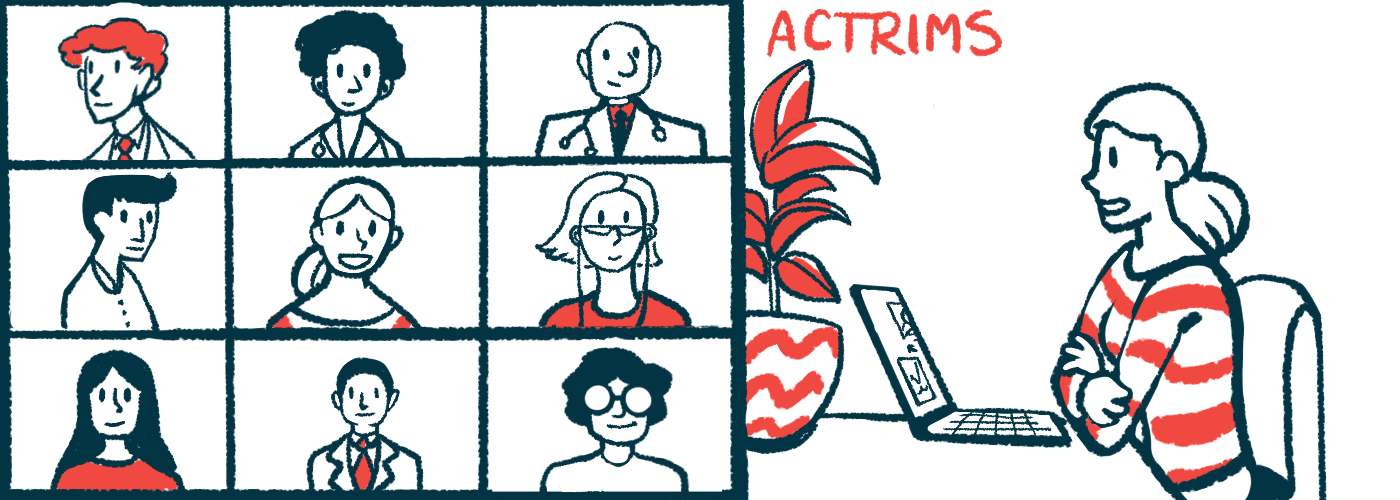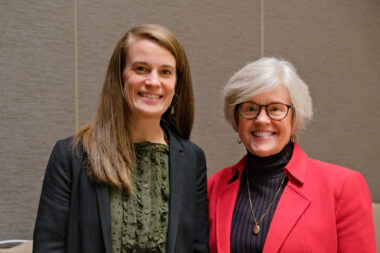ACTRIMS 2023: Can Do MS brings education, connection, activation
The nonprofit offers a variety of programs and resources for the MS community
Written by |

Can Do MS has three missions for people with multiple sclerosis (MS) and their care partners — providing education about life with the disease, building connections among people, and activating them to be proactive about managing their condition.
“Those are the three pillars that our programs are built upon … education, connection, and activation,” Kathy Costello, chief operating officer of Can Do MS, said in an interview with Multiple Sclerosis News Today during the Americas Committee for Treatment and Research in Multiple Sclerosis (ACTRIMS) Forum.
“Can Do MS is an organization that provides education and support and resources around health and wellness issues facing people with multiple sclerosis to help them move their lives forward,” Costello said.

Kirsten Kiefer, left, is the director of development at Can Do MS and Kathy Costello is the organization’s chief operating officer.
The nonprofit organization offers a variety of programs and resources for the MS community. These include a range of written educational materials as well as webinars and podcasts on topics such as mental health, managing symptoms, and working with specialty pharmacies. It also organizes community programs where people can come together, virtually and in person, to connect, learn, and discuss. The group offers monthly community programs for all patients as well as quarterly meetups designed for the Black MS community to discuss their own unique challenges.
At ACTRIMS, Costello and Kirsten Kiefer, director of development for Can Do MS, met with other stakeholders, particularly those working with other MS advocacy organizations.
“What the advocacy groups do well is that we all kind of see where there are strengths and what other people are doing, and try to align so that we’re not overlapping too much, or see where there’s a lot of overlap … I think there’s opportunity there to be able to just always collaborate or work together,” Kiefer said.
Coaching and exercise to meet goals, improve function
Can Do MS also offers a coaching program, where people can meet in small groups with experts to discuss their goals and how to achieve them. Four coaching sessions are held each year. The next one from March 14 to April 11 will focus on diet and nutrition with a particular emphasis on “making diet changes that stick.”
“It doesn’t matter what diet it is. It’s not about if you’re on this diet or that diet. It’s how do you stay with it. It’s so hard to change a habit, right? And so the coaching series is constructed around setting goals that are attainable for you,” said Costello, who worked as a nurse practitioner in an MS center before joining up with Can Do MS. She said the coaching program focuses on not just setting goals, but designing strategies to attain those goals, something medical professionals don’t often do.
“You know, in the healthcare community, we spend an enormous amount of time telling people what to do,” Costello said “I did it for years … We ‘should’ people.” You know, ‘you really should consider quitting smoking,’ ‘you really should exercise more.’ That’s almost shaming somebody. It’s not the approach that’s going to get any results. And remarkably, when people would come back to see me, they hadn’t done what I just ‘should’ them to do.”
Instead of ‘should-ing’ patients, the coaching program is led by the patients’ goals that experts work to facilitate, Costello said.
That’s different than “putting information out there and saying, ‘do this,'” Kiefer said. “It’s taking the step further to connect with our participants, but also for them to connect together [and ask], ‘what are you going to carry from this into your life? What can you do with this?'”
Another noteworthy program is MS Moves, which focuses on exercises to improve a person’s ability to function, from getting around in the kitchen to getting more comfortable in bed.
“People with MS often have trouble doing certain things that used to be easy. It might be opening a jar, it could be getting up out of a chair, it could be maintaining balance. So these exercises that we have are directed towards function,” Costello said. “So, ‘Oh, you’re having trouble getting up out of a chair?’ We have a whole series of exercises that will strengthen those muscles that get you up out of a chair. ‘Oh, you’re having trouble with that jar?’ Here’s some hand exercises that can provide some strengthening, and so on.”
The video exercise program also offers monthly virtual meetups where expert instructors answer patients’ questions. The instructors will “clarify the exercises, show people how to adapt them for a particular problem that they’re having or an issue, and then people can talk to one another,” Costello said, adding this can help patients stay motivated and stick with exercise.
CMSC will focus on invisible symptoms
Can Do MS has been invited to host a patient day program as part of a meeting by the Consortium of MS Centers (CMSC) on June 2 at Gaylord Rockies Resort and Convention Center in Aurora, Colorado. The day of programming and happy will be available through virtual attendance and a video archive will be posted after the event.
“We were thrilled for the opportunity,” Kiefer said, adding Can Do MS will take the opportunity to introduce its programs. “There’ll be little bite size pieces of all of our programs and our speakers that we work with,” she said.
The event will also focus on the so-called invisible symptoms of MS, such as fatigue and pain, that aren’t immediately obvious.
“These are symptoms that people really struggle with because no one can see them, and they’re hard for others to wrap their head around. … [For example], the pain in MS can be excruciating, but you can’t see it. And so when someone says, ‘but I’m in so much pain,’ you look fine, right?” Costello said. “People struggle to help their family understand it, to help their providers understand it, to help themselves understand it.”
Kiefer said sometimes patients don’t connect their symptoms to their disease. “And so I think just bringing it out from the dark and putting it on the table, and identifying it, and talking about it” can be helpful for patients, she said.
Working to ease these symptoms and making everyday life more bearable requires patients to communicate their needs, especially since healthcare professionals don’t always make time for these conversations.
“The provider has a lot of things that they have to do … things like disease-modifying therapies that you have to monitor … a lot of the visit time is sucked up with things that are important,” Costello said, noting this doesn’t leave much time to talk about managing symptoms.
“And so it has to be the person that says, ‘I need to talk about this today.’ So where we would help is that if you can learn a little bit about it, you’re going to have a lot more confidence going into that conversation so that you can get what you need,” she said. “If you don’t mention it, it’s never going to get addressed. And that is probably the number one thing — that you’ve got to tell somebody.”
Nearly four decades of helping patients, care partners
The organization that would become Can Do MS was started in 1984 by Jimmie Heuga, an Olympic skier who won the bronze medal in 1964, just seven years before being diagnosed with MS.
“At that time, the conventional wisdom was, don’t exercise, don’t get overheated, don’t get stressed out, and don’t come back,” Costello said. “He couldn’t live that way, and so he started to participate again in exercise and he also added things like dietary changes and motivation. But he found that he was doing better despite everyone telling him he was going to do worse … and he wanted to share that with the world.”
What started as a weeklong program called the Jimmie Heuga Center for Multiple Sclerosis would eventually evolve into Can Do MS after Heuga’s death in 2010. The organization’s name refers to Heuga’s mantra — to “find the things that you can do,” Costello said.
“After 37 years of growth and change, we’re just continuing to evolve and meeting the community with our best foot forward,” Kiefer said, adding the organization recently launched a new logo and website, and completed accessibility testing for visitors to it.
Families, care partners need to ‘feel supported,’ too
Can Do MS also pays attention to the families of MS patients and their care partners.
“We have programs for people living with MS, but also their support partners. We say it’s not a ‘me’ disease, it’s a ‘we’ disease,” Kiefer said.
Costello said it’s common for support partners of people with MS to feel guilt over struggling in their role. “It can create a lot of relationship conflict for that family unit because of everyone’s experiencing this disease in their own way. And sometimes that’s never really brought up in conversation, and so people suffer in silence.”
Just as with managing patient symptoms, the key first step in addressing care partner struggles is to openly communicate them so they can begin to be dealt with. Bringing support partners together through programs like those at Can Do MS can help get those conversations started.
“Having this opportunity for people to learn together, but then to find support from people who are also going through the exact same thing they’re going through has really been helpful,” Costello said, adding that care partners “need a space where they can share that information and then learn from others and feel supported.
“We really take a lot of time and effort to create programs and support for support partners,” Costello said. “And I think when the family is healthy, the person living with the disease is going to do better.”
Note: The Multiple Sclerosis News Today team is providing in-depth coverage of the ACTRIMS Forum 2023 Feb. 23-25. Go here to see the latest stories from the conference. Follow along on Facebook, Twitter, and Instagram for live updates using the hashtag #actrims2023.


